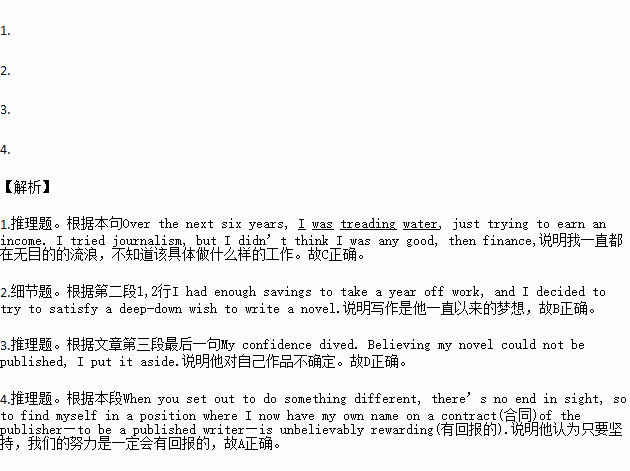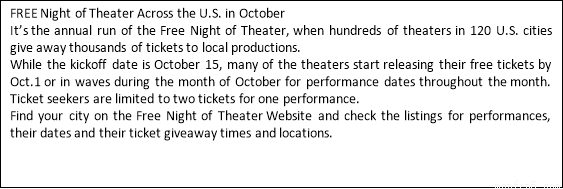题目内容
A
I left university with a good degree in English Literature, but no sense of what I wanted to do. Over the next six years, I was treading water, just trying to earn an income. I tried journalism, but I didn’t think I was any good, then finance, which I hated. Finally, I got a job as a rights assistant at a famous publisher. I loved working with books, although the job that I did was dull.
I had enough savings to take a year off work, and I decided to try to satisfy a deep-down wish to write a novel. Attending a Novel Writing MA course gave me the structure I needed to write my first 55,000 words.
It takes confidence to make a new start — there’s a dark period in-between where you’re neither one thing nor the other. You’re out for dinner and people ask what you do, and you’re too ashamed to say, “Well, I’m writing a novel, but I’m not quite sure if I’m going to get there.” My confidence dived. Believing my novel could not be published ,
I put it aside.
Then I met an agent(代理商)who said I should send my novel out to agents. So, I did and, to my surprise, got some wonderful feedback. I felt a little hope that I might actually become a published writer and, after signing with an agent, I finished the second half of the novel.
The next problem was finding a publisher. After two-and-a-half years of no income, just waiting and wondering, a publisher offered me a book deal — that publisher turned out to be the one I once worked for.
It feels like an unbelievable stroke of luck — of fate, really. When you set out to do something different, there’s no end in sight, so to find myself in a position where I now have my own name on a contract of the publisher — to be a published writer — is unbelievably rewarding.
1.What does the underlined part in Paragraph 1 mean?
A. I was waiting for good fortune.
B. I was trying to find an admirable job.
C. I was being aimless about a suitable job.
D. I was doing several jobs for more pay at a time.
2.The author decided to write a novel ______ .
A. to finish the writing course
B. to realize her own dream
C. to satisfy readers’wish
D. to earn more money
3.How did the writer feel halfway with the novel?
A. Disturbed. B. Ashamed. C. Confident. D. Uncertain.
4.What does the author mainly want to tell readers in the last paragraph?
A. It pays to stick to one’s goal.
B. Hard work can lead to success.
C. She feels like being unexpectedly lucky.
D. There is no end in sight when starting to do something.




